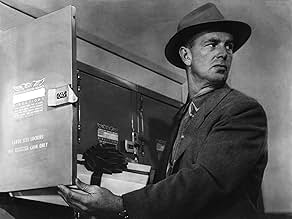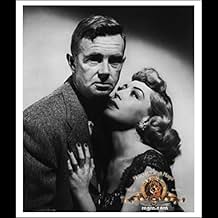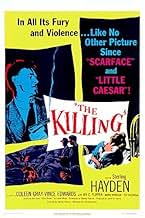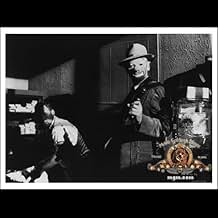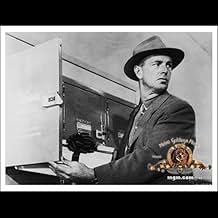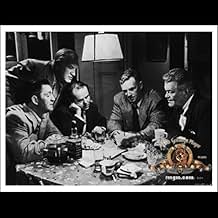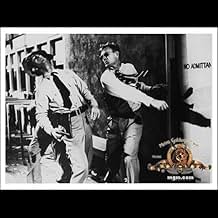Un truand monte une équipe de cinq hommes dans le but de planifier et d'exécuter un audacieux braquage pendant une course de chevaux.Un truand monte une équipe de cinq hommes dans le but de planifier et d'exécuter un audacieux braquage pendant une course de chevaux.Un truand monte une équipe de cinq hommes dans le but de planifier et d'exécuter un audacieux braquage pendant une course de chevaux.
- Réalisation
- Scénario
- Casting principal
- Nomination aux 1 BAFTA Award
- 1 nomination au total
Ted de Corsia
- Patrolman Randy Kennan
- (as Ted DeCorsia)
Elisha Cook Jr.
- George Peatty
- (as Elisha Cook)
Joe Turkel
- Tiny
- (as Joseph Turkel)
Avis à la une
The Killing is a film whose legacy can still be seen in many films today. This film is not only Stanley Kubrick's first acclaimed film, but it is also credited with inventing the concept of non-linear story telling for the film industry. Some recent films that have used this technique are Reservior Dogs, Pulp Fiction, Go, Wonderland and The Usual Suspects.
The story deals with a motley crew of assorted criminals, inside men, and average joes just looking to get their hands on a large sum of money by stealing it from a racetrack. Sterling Hayden plays Johnny Clay, a hardened criminal who just finished serving a five-year prison sentence. He is the ringleader of the bunch who is determined to only go for the big heists from now on. He figures they can put you away for stealing ten dollars as easily as ten million, so what have you got to lose? The rest of the crew are mostly average people with average problems, as Clay explains early on. Some of them work at the track. One is a crooked cop. Two are hardened criminals added at the last minute to cause diversions. Everything has been timed and planned out to the letter. Of course in a film like this, things never go as planned. It wouldn't be entertaining if they did.
The killing was made on a budget of well below half a million dollars, and it shows. The film looks cheap at times, but the story is more than enough to make you forgive its financial shortcomings. The acting is nothing too special. Hayden is strong and resourceful as Johnny Clay, but he's pretty wooden. Elisha Cook Jr. is pretty good as a hen-pecked husband who is taking part in the scheme to impress his high-maintenance wife. If this film were re-cast today, you'd have to think of William H. Macy to play this character. Timothy Carey is always memorable, even with such a small part like the one he has here. Such a strange-looking guy! He gets the most interesting assignment of all the people in on the heist.
You can really tell this was made fifty years ago. Even though there are hardened criminals and low-lifes in nearly every scene, nobody ever says the F-word! There is, however, a fairly gory shootout in one scene which you normally didn't find in films back then. The killing was ahead of its time in more ways than one, I guess. Please be sure to check this one out! 8 of 10 stars.
The Hound.
The story deals with a motley crew of assorted criminals, inside men, and average joes just looking to get their hands on a large sum of money by stealing it from a racetrack. Sterling Hayden plays Johnny Clay, a hardened criminal who just finished serving a five-year prison sentence. He is the ringleader of the bunch who is determined to only go for the big heists from now on. He figures they can put you away for stealing ten dollars as easily as ten million, so what have you got to lose? The rest of the crew are mostly average people with average problems, as Clay explains early on. Some of them work at the track. One is a crooked cop. Two are hardened criminals added at the last minute to cause diversions. Everything has been timed and planned out to the letter. Of course in a film like this, things never go as planned. It wouldn't be entertaining if they did.
The killing was made on a budget of well below half a million dollars, and it shows. The film looks cheap at times, but the story is more than enough to make you forgive its financial shortcomings. The acting is nothing too special. Hayden is strong and resourceful as Johnny Clay, but he's pretty wooden. Elisha Cook Jr. is pretty good as a hen-pecked husband who is taking part in the scheme to impress his high-maintenance wife. If this film were re-cast today, you'd have to think of William H. Macy to play this character. Timothy Carey is always memorable, even with such a small part like the one he has here. Such a strange-looking guy! He gets the most interesting assignment of all the people in on the heist.
You can really tell this was made fifty years ago. Even though there are hardened criminals and low-lifes in nearly every scene, nobody ever says the F-word! There is, however, a fairly gory shootout in one scene which you normally didn't find in films back then. The killing was ahead of its time in more ways than one, I guess. Please be sure to check this one out! 8 of 10 stars.
The Hound.
Stanley Kunbrick was still in his twenties when he made this film, yet his confidence and self-assurance are all over it. It is a well-written story, co-written by Kubrick (based on a novel called "A Clean Break"), about a meticulously planned horetrack heist told from the point of view of the several people who were in on the plot. Most of these guys weren't professional criminals, but otherwise honest men who were down on their luck and needed a break. They turned to this audacious plan in desperation, thinking they could do some real good in their lives with their share of the money. I won't give away the ending of course, but keep in mind this is a Kubrick film. That's all I say about that.
Standouts include Sterling Hayden as the ringleader, Marie Windsor as a snide, manipulative woman, Elisha Cook as her milquetoasty husband, Timothy Carey, as creepy as ever, and Kola Kwariani, the thinking man's Tor Johnson, as a chess expert/hired thug.
Speaking of chess, this is the first movie I've ever seen with a scene taking place in a chess parlor. Being from a provincial New England town, and not being a chess afficionado, I never knew such places existed.
Standouts include Sterling Hayden as the ringleader, Marie Windsor as a snide, manipulative woman, Elisha Cook as her milquetoasty husband, Timothy Carey, as creepy as ever, and Kola Kwariani, the thinking man's Tor Johnson, as a chess expert/hired thug.
Speaking of chess, this is the first movie I've ever seen with a scene taking place in a chess parlor. Being from a provincial New England town, and not being a chess afficionado, I never knew such places existed.
There is a plan that just can't fail no matter what, take the racetrack's banked cash roll, take all it's got, everybody knows their place, where to be for the big race, then where to gather, to take their share, of the big pot.
A piece of cinema magic that to this day leaves you astounded at the brilliance of the writer/director, amazed at the sensational performances by some truly great actors, and as engaged as you could ever hope to be with a story that nestles nicely in the age and the era from which it was born, an accomplishment that so many films of that time fail to achieve when revisited.
A piece of cinema magic that to this day leaves you astounded at the brilliance of the writer/director, amazed at the sensational performances by some truly great actors, and as engaged as you could ever hope to be with a story that nestles nicely in the age and the era from which it was born, an accomplishment that so many films of that time fail to achieve when revisited.
'The Killing' has been overshadowed by Stanley Kubrick's subsequent better known and better made movie masterpieces. Films like 'Dr. Strangelove', '2001' and 'A Clockwork Orange' are much more flamboyant and intellectually exciting than this early hard boiled crime thriller, but for my money it is still one of his most entertaining movies, and in its own modest way just as brilliant as his more talked about films. 'The Killing' is still one of the greatest crime thrillers ever made, and one which influenced many film makers working in this genre, not the least of which Quentin Tarantino, who obviously worships this picture, and used its innovative structure as major inspiration for 'Pulp Fiction'. Kubrick wrote 'The Killing's script as well as directing, but made the smart move of asking "the Dime Store Dostoevski" Jim Thompson, author of pulp classics like 'The Killer Inside Me' and 'The Getaway' to supply the fresh and memorable dialogue. Sterling Hayden, who later achieved screen immmortality as General Jack D. Ripper in 'Dr Strangelove', is perfect as ambitious small time crook Johnny Clay. He is surrounded by an almost flawless supporting cast. I qualified that because I wasn't totally convinced by Coleen Gray who plays Johnny's girlfriend. However she only really has one scene, and the rest of the cast more than makes up for her. Especially memorable are the mis-matched husband and wife played by Elisha Cook, Jr ('The House On Haunted Hill') and the sultry Marie Windsor (noir classic 'Narrow Margin'). Their scenes together are simply terrific. Also noteworthy are the two scenes featuring legendary crazy Timothy Carey ('The Killing Of A Chinese Bookie'). Carey was one of the most extraordinary performers to set foot in front of a movie character, and is unforgettable. Kubrick obviously thought highly of him as he subsequently cast him in his anti-war classic 'Paths Of Glory', a move which antagonised the movie's star Kirk Douglas. Even if 'The Killing' didn't feature such a strong performance from Sterling Hayden it would be worth watching just to catch Cook, Windsor and Carey. On top of that you have some other great actors such as Vince Edwards, an innovative script, hip dialogue and some brilliant directorial touches. This exciting heist movie can't be recommended highly enough, it's a real treat for film buffs. A brilliant film that still packs a punch after almost fifty years, something I doubt you will be saying about many movies currently showing in today's theatres. 'The Killing' is a super cool suspense movie and not to be missed!
The story of a meticulously-planned race track hold-up is a stunner in every minute you watch it, and the film's progressive use of a partly documentary style has often been acclaimed as uniquely supporting the dramatic goings-on. It definitely put a modern touch to the somewhat out-of-fashion film noir in 1956, but still greatly relied on its basic rules.
A fine new note was the neat distinction between the gang's members' motives, ranging from repaying underworld debts (De Corsia) and hope of offering a better life for his ill wife (Sawyer) to the vain ambition of pleasing his vamp wife by doing something special (Cook).
Despite the film's qualities, Kubrick's treatment of the women's rôles seems more than old-fashioned today. Women here are either the homely and sweet type (Coleen Gray) or the Bette-Davis-eyed and cherchez-la-femme type (Marie Windsor). Both are accordingly taller or smaller than their respective partners by a head.
I should like to mention one of my favourite pans: that's when the bald philosopher-catcher walks up to Joe Sawyer's bar. Lucien Ballard's camera follows him all across the crowded tote hall, a take which must have been very difficult to organize and shoot. Later, the scene is repeated with Sterling Hayden.
This motion picture is also a monument for the great histrionic art of Elisha Cook, Jr., in a stand-out performance as the born loser. (German dubbing gives him the apt voice of Stan Laurel's speaker Walter Bluhm.) This little man never just did his job in unnumerable supporting rôles but has rendered effective homage to the tragic figure on the silver screen more than any other (non-comical) character actor I can think of. Regardless of his versatility in lots of different films, his impersonations of a likeable man who is doomed to fail make him unforgettable: take his lethal parts in "Phantom Lady" (1944), "Shane" (1953) or the likes, the audience's sympathy was always with this fine actor.
A fine new note was the neat distinction between the gang's members' motives, ranging from repaying underworld debts (De Corsia) and hope of offering a better life for his ill wife (Sawyer) to the vain ambition of pleasing his vamp wife by doing something special (Cook).
Despite the film's qualities, Kubrick's treatment of the women's rôles seems more than old-fashioned today. Women here are either the homely and sweet type (Coleen Gray) or the Bette-Davis-eyed and cherchez-la-femme type (Marie Windsor). Both are accordingly taller or smaller than their respective partners by a head.
I should like to mention one of my favourite pans: that's when the bald philosopher-catcher walks up to Joe Sawyer's bar. Lucien Ballard's camera follows him all across the crowded tote hall, a take which must have been very difficult to organize and shoot. Later, the scene is repeated with Sterling Hayden.
This motion picture is also a monument for the great histrionic art of Elisha Cook, Jr., in a stand-out performance as the born loser. (German dubbing gives him the apt voice of Stan Laurel's speaker Walter Bluhm.) This little man never just did his job in unnumerable supporting rôles but has rendered effective homage to the tragic figure on the silver screen more than any other (non-comical) character actor I can think of. Regardless of his versatility in lots of different films, his impersonations of a likeable man who is doomed to fail make him unforgettable: take his lethal parts in "Phantom Lady" (1944), "Shane" (1953) or the likes, the audience's sympathy was always with this fine actor.
Le saviez-vous
- AnecdotesInitial test screenings were poor, citing the non-linear structure as the main problem. Stanley Kubrick was forced to go back and edit the film in a linear fashion, making the film even more confusing. In the end, it was released in its original form, and is often cited as being a huge influence on other non-linear films like Reservoir Dogs (1992) and Pulp Fiction (1994).
- GaffesDuring the robbery, it's clear that a significant amount of the money is in neatly banded bundles of crisp brand-new bills, yet when it's transferred from the duffel bag to the suitcase, all the bills are loose, unstacked, and appear well-used.
- Citations
Johnny Clay: You'd be killing a horse - that's not first degree murder, in fact it's not murder at all, in fact I don't know what it is.
- ConnexionsEdited into Hai-Kubrick (1999)
Meilleurs choix
Connectez-vous pour évaluer et suivre la liste de favoris afin de recevoir des recommandations personnalisées
Détails
- Date de sortie
- Pays d’origine
- Langue
- Aussi connu sous le nom de
- Casta de malditos
- Lieux de tournage
- Société de production
- Voir plus de crédits d'entreprise sur IMDbPro
Box-office
- Budget
- 320 000 $US (estimé)
- Montant brut mondial
- 380 $US
- Durée
- 1h 24min(84 min)
- Couleur
Contribuer à cette page
Suggérer une modification ou ajouter du contenu manquant


